new posts in all blogs
Viewing: Blog Posts Tagged with: the good fight, Most Recent at Top [Help]
Results 1 - 12 of 12
How to use this Page
You are viewing the most recent posts tagged with the words: the good fight in the JacketFlap blog reader. What is a tag? Think of a tag as a keyword or category label. Tags can both help you find posts on JacketFlap.com as well as provide an easy way for you to "remember" and classify posts for later recall. Try adding a tag yourself by clicking "Add a tag" below a post's header. Scroll down through the list of Recent Posts in the left column and click on a post title that sounds interesting. You can view all posts from a specific blog by clicking the Blog name in the right column, or you can click a 'More Posts from this Blog' link in any individual post.
So there's been a bit in the media lately about women writers and some other related bits and pieces. And I know this is a soapbox that I've jumped up and down on before, but I'm going to have to keep jumping for now.
First, there's an article in the Telegraph about the Orange Prize, a literary award for women writers:
Given that women have won five out of the last six Whitbread/Costas, does the level of injustice remain enough to justify the Orange? Women are predominant, in terms of numbers and power, in most of the major publishing houses and agencies. They sell most of the books, into a market that largely comprises women readers. They are favoured by what is overwhelmingly the most important publishing prize (the Richard and Judy list), and comprise most of the reading groups that drive sales. Girls in schools are more literate than boys, and pupils are taught reading mainly by female teachers promoting mainly female writers.
Well. A few points, if I may.
- Six out of the last 20 Booker Prize Winners have been women.
- Two out of the last 20 Booker Prize Winners have had a female protagonist. That's 10%.
- Publisher's Weekly's Best Books of 2010 list are all by men.
- Our own Miles Franklin longlist features 3 women and 9 men.
- There are more women working in publishing than men, more women write books and more women read books. This is all true. Yet capital-L-literary awards are undeniably skewed towards men.
- There are more female teachers because teaching continues to be a low pay, low status job.
- Despite this, the vast majority of class texts are by men, and feature male protagonists.
- In VCE this year, there are 9 texts available by women, and 27 by men.
- I know of a local private girls' school where, from Years 7-10, not one text is studied featuring a female protagonist. NOT. ONE.
What this is telling us, and the message we are sending to young people (both male and female) is this: despite the fact that the majority of people involved in the publishing industry are women, our society as a whole deems women's stories as unimportant (at least as far as capital-L-literature is concerned). Female authors only get recognised when they write about men. And I am not in ANY way blaming men for this. It's something we're all doing together. As a whole literary culture.
Here's Lizzie Skurnick:
"I just want to say," I said as the meeting closed, "that we have sat here and consistently called books by women small and books by men large, by no quantifiable metric, and we are giving awards to books I think are actually kind of amateur and sloppy compared to others, and I think it's disgusting."
Our default is that women are small, men are universal.
Here's a (relatively mild) comment from that article about the Orange Prize:
I am a life long reader and have read thousands of books, however I have read probably less than 20 books written by women. Women write differently from men and I feel their efforts appeal mostly to other women.
Which brings me to our friend Nicholas Sparks. Nicholas is the author of
The Notebook,
Nights in Rodanthe and
Dear John, among others. First, I have to admit that I've never read any of his books, nor seen any of the film adaptations. But I've seen the
previews, and that was enough to know that it isn't really my thing. On the whole, I prefer my rom to also include com.
So Nicholas
7 Comments on Rant. Women. Writing. Chicklit., last added: 3/21/2010
When I was in the UK, I made a special visit to Bletchley Park. This was part-research for a percolating book-idea, but mostly I went there for wholesome nerdy awesome. And Bletchley delivered.
Ever since I read Neal Stevenson's Cryptonomicon I've wanted to visit Bletchley Park. It's an hour and a bit out of London, and there's a fascinating (and pleasingly lofi) series of museums and things there, including the National Museum of Computing. Also, Ian Fleming used to work there as a gopher, and obviously got some good spy-related ideas because he ended up writing some books that became quite popular.
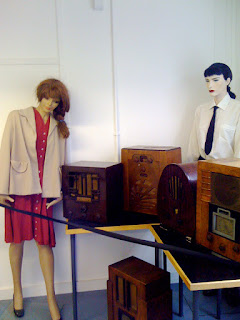 I meant it when I said lo-fi
I meant it when I said lo-fiBletchley Park was a code-breaking centre during WW2. It was where a very intelligent man called Alan Turing broke the
Enigma Machine - a contraption for encoding messages used by the Germans. It looks like this:
Working at Bletchley Park involved lots of TOP SECRET things, and you couldn't get in or out without a special pass. There were also lots of women who worked there, because working on code-breaking and other surveillancey things was a good way for women to be involved in the war without having to put on special pants and actually go and kill people. And some of those women had kids who had to go to school. So even the kids needed the special pass to get in and out of the Park. These kids were the youngest people ever to sign the Official Secrets Act.
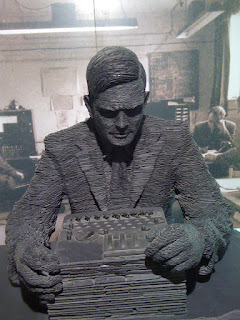
So let's talk about Alan Turing. The good news is that he invented something (called a Turing machine) that ended up evolving into the machine I'm typing this on right now. His use of electronic calculation and algorithming was what enabled the British to break the Enigma machine.
Time Magazine declared Turing as one of the 100 most important people of the 20th century, and said: "the fact remains that everyone who taps at a keyboard, opening a spreadsheet or a word-processing program, is working on an incarnation of a Turing machine."
Now here's the bad news. Alan Turing was gay (that bit wasn't the bad news, it's coming next). And during his lifetime, homosexuality was illegal and thought of as a mental illness. Turing was prosecuted in 1952. He had a choice between going to jail or taking female hormone treatment to "cure" him. His security clearance was removed and he was no longer permitted to work for the government. In 1954 he killed himself by eating an apple laced with cyanide.
BUT, on September 10 2009, after a recent petition endorsed by Richard Dawkins and Ian McEwan, the British government officially apologised to Turing. Here's what Gordon Brown said:
While Mr Turing was dealt with under the law of the time and we can't put the clock back, his treatment was of course utterly unfair and I am pleased to have the chance to say how deeply sorry I and we all are for what happened to him... So on behalf of the British government, and all those who live freely thanks to Alan's work I am very proud to say: we're sorry, you deserved so much better. (full statement here)
Which is awesome and encouraging and only 55 years overdue.
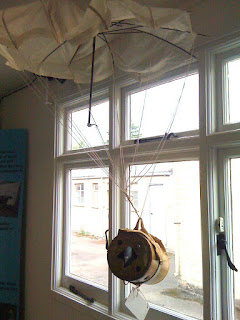
This was from a totally awesome exhibit titled PIGEONS IN WAR. Did you know some pigeons got bravery medals?
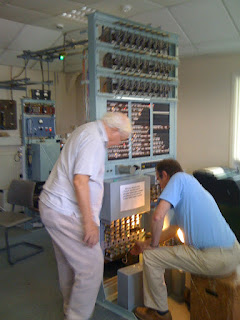
Here are some Real Live Boffins working on a Very Old Computer.

And more good news - for the first time ever, Bletchley Park is
going to receive National Lottery Funding, so it won't have to just survive on donations any more. Hurrah!
Anyway, I totally recommend a visit. And if you want to read more, Neal Stephenson's
Cryptonomicon is a great read that blends all sorts of computery code-breakingly nerdery into one awesome novel.
Mark Day in The Australian wrote an article that said this:
TEENAGERS are not like us. They grunt rather than converse, slouch rather than walk, sleep till noon and their preferred dress is grunge—any black T-shirt featuring gross green slime dripping from a skull will do. They don’t read, don’t pay for music, don’t listen to adults and don’t care about Twitter.
Below is my response.
Hi Mark,
I run a website for teenagers about books and reading at the State Library of Victoria, and I wanted to bring a couple of things to your attention after reading your article in the Australian on Monday.
You're wrong when you say young people don't read. Really wrong. In Australia last year, six of the top ten bestsellers in ALL genres were young adult fiction titles. In the US, Borders is ditching their music/DVD sections and replacing them with sprawling teen sections to capitalise on the enormous boom in young adult fiction. Last year, booksales as a whole dropped 4.7%, but YA sales were up 13%. Our website gets thousands of visitors a day, young people desperate to talk about their favourite books. Young people respond creatively to the books they read, with fan fiction, art and music. They love literature so much that they want to spend more time with the characters they love.
The "fragmented, flipperty-gibbet" teens you disparage so flippantly are the most active generation in terms of volunteering, working for charity organisations, and engaging in issues like climate change and human rights. They are socially aware and active. Last year in the US thousands of teens and YA authors banded together in an online community called YA for Obama. The young people were frustrated that they couldn't vote in the US election, and were eager to find other ways that they could make a difference and affect social change. I attended an online chatroom in YA for Obama during one of the Presidential Debates, and found the room full of not just Americans, but British kids up past their bed time and Australians in the computer room at school on their lunch break. And let me tell you, these teenagers had a more comprehensive understanding of the complexity of the US political system than, I suspect, the vast majority of American voting adults. They knew about and cared about the issues. They had opinions, and were desperate to make a difference.
And sure, there's plenty of them who don't read newspapers. But for every teen you find me who doesn't read a newspaper, I'll find you fifty adults who don't either.
However, if you did want teenagers to start reading your newspaper, I'll offer you three suggestions.
1. Stop filling your pages with poorly-researched offensive comments about them.
2. Include content that is relevant to a teenage audience. Hey, you could even publish some content written by teenagers (The Guardian does this regularly with enormous success).
3. Start the newspaper reading habit early. Have a children's section of the paper. A REAL children's section, not a token half page with a Wordsearch puzzle. Address news stories that are relevant to kids and write them in a language they'll understand. You can find examples of this in Canada and the UK.
It's a shame that our society - and in particular our media - seem to be so obsessed with dragging new generations down. It would be awesome to see a little more encouragement of young people, and a little less small-minded snippery.
Regards,
Lili Wilkinson.
You know the one age group of Californians who voted against Proposition 8?
CNN exit poll*
Vote by Age Yes No
18-29 39 61
30-44 55 45
45-64 54 46
65+ 61 39
Proposition 8, for those of you who might not know, was a proposed constitutional amendment that would make gay marriage illegal in California. It passed, being the one nasty small-minded smudge on what was otherwise a proud day for America.
But have a look at those numbers. The only group who voted No - voted against discrimination - was the young people.
Have a look at this map, sent to me by the wondrous Snazzy.
It's often easy to cry that the world is going to hell-in-the-proverbial, but sometimes it helps to take a step back. Yes, there is still sexism, homophobia, religious intolerance, religious fanaticism, poverty, discrimination, global warming and racism in the world. But we're getting better. Overall, long-term, things are getting better. And from what I see in the world, and what the data above suggests, is that, over time, we are becoming more open-minded, more unprejudiced, more understanding**.
Here, also from Snazzy, is a letter written by an eight-year-old Filipino-American girl to Barack Obama with some advice about a dog, and a request that he make a law that requires everyone to recycle, and also ban unnecessary wars***.
In Obama's response, he writes, "I want you to look up the word 'empathy' in the dictionary. I believe we don't have enough empathy in our world today, and it is up to your generation to change that... I hope you will always be an active participant in the world around you, and that you will seize every opportunity to make the world better. Seeing young people like you who care about making things better inspires me and gives me great hope about the future of our country."

In
today's New York Times Op-Ed, Al Gore proposes to make all of the US's electricity renewable within 10 years. The article is passionate and practical, and I highly recommend you read it (especially you, Mr Rudd). But here is the bit that made me cry:
Looking ahead, I have great hope that we will have the courage to embrace the changes necessary to save our economy, our planet and ultimately ourselves.
In an earlier transformative era in American history, President John F. Kennedy challenged our nation to land a man on the moon within 10 years. Eight years and two months later, Neil Armstrong set foot on the lunar surface. The average age of the systems engineers cheering on Apollo 11 from the Houston control room that day was 26, which means that their average age when President Kennedy announced the challenge was 18.
This year similarly saw the rise of young Americans, whose enthusiasm electrified Barack Obama’s campaign. There is little doubt that this same group of energized youth will play an essential role in this project to secure our national future, once again turning seemingly impossible goals into inspiring success.
People often ask me why I write for teenagers. This is why.
______________________________
**I was going to say "more tolerant", but I've made a personal pledge to stop using that word. The dictionary tells me that "tolarate" means "to accept or endure something unpleasant or disliked with forbearance". It's a horrible thing to say (I'm looking at YOU, Palin).
***She is an Obama fan despite the fact that her parents are named John and Cindy. For serious.
It has been brought to my attention that I haven't been posting much about my actual writing of books. So I present an interview with Lili Wilkinson, Author. By me. About what I'm writing.
Self: So. Lili. How's the writing going?
Lili: Very well, thank you.
Self: Are you working on a book at the moment?
Lili: Actually, I'm working on two books at the moment.
Self: (mutters) Overachiever.
Lili: (modest cough)
Self: So what are these books about?
Lili: Hmm. They are about (in no particular order): love, high school, bisexuality, belief, obsession, silvery fish, musical theatre, the Holy Land, stage crew, Isaac Newton, pirates and pink cashmere jumpers.
Self: I'm not sure that was a very helpful answer.
Lili: Fine. One of the books is about bisexuality, stage crew and high school musicals. The other is about the Children's Crusade.
Self: The what?
Lili: In 1212, an army of 10 000 kids marched through France and Italy to save Jerusalem from the Infidel.
Self: Wow! Really?
Lili: Probably not, actually, given that there are no contemporary records of it. But it's a great story nonetheless.
Self: Did they get there? To Jerusalem?
Lili: No. They were kidnapped by pirates and sold into slavery.
Self: A feel-good kind of story, then.
Lili: It's your average boy-meets-spiritual-guru-and-follows-blindly-into- mortal-peril romcom. Think Stand By Me meets Ten Things I Hate About You meets John 6:5-15, with just a whiff of The God Delusion for good measure.
Self: Right. And the other one? The musical theatre one?
Lili: It's about a lesbian who secretly thinks she might like boys.
Self: A going-back-into-the-closet story?
Lili:
Sort of. It's supposed to be my response to
this.
Self: Is it just me, or are both these books a little... controversial?
Lili: Pfft. I'm just getting started.
Self: Do either of these books have a title?
Lili: The stage crew one is currently called Pink is for Girls, although that may well change. The Children's Crusade one has no title, and I shall pay cold hard cash for a good one. Anybody? Anybody?
Self: Well, it's good to see you've been keeping busy.
Lili: Thank you. Can I get back to it now? I haven't met today's deadline yet.
Self: Right, of course. Carry on.
So a trainer at the Bonnie Doon Football Club was fired because he came out as being bisexual.
Nice.
Then, ex-Premier, wannabe-Mayor and head of Beyond Blue, Jeff Kennett said that was a good thing. Because having a bisexual work as a football coach was like having a pedophile working as a masseur at the club.
I'm sorry? Let's have that again:
It was like having a pedophile working as a masseur at the club.
You'd be forgiven for not knowing this, given that it was reported quietly in the Herald Sun, but not in The Age or The Australian at all.
If the head of an organisation that helps people struggling with depression publically claims that bisexuality and pedophilia are the same thing, then there is something seriously wrong with the world.
He needs to resign. And forget about being Mayor. Give John So the job for life.
 I devoured this book over two days.
I devoured this book over two days.
It's scary.
Really scary.
Scary in the way that 1984 is but times a million, because 1984 is about a future that never happened, but Little Brother is about right now.
Basically, it's about what happens after a terrorist attack in San Francisco. Marcus, a relatively normal 17 year old with a penchant for minor hackery, gets arrested by the Department of Homeland Security for being found near the attack site without a good excuse. He is taken to a secret offshore prison, tortured, and then forced to sign a document stating that he was held voluntarily.
Outside, the DHS is taking over. Civil liberties are being stripped from citizens who happily allow it because it's making them safer. A general air of terror and paranoia lies over everything. And Marcus can't help wondering - who are the real terrorists, here?
It's an extraordinary novel that every teenager should read. Every adult should read it too, but it's young people who really need to read it. I think it'll really speak to the new generation of technology and news-savvy kids who are growing up in a world where fear and secrecy are considered to be the same thing as security*.
The world is a scary place, and it's easy to believe that there's nothing you can do - especially if you belong to one of the most politically disenfranchised groups of people in the world - young people. Hopefully Little Brother will encourage them to take a little turf back.
You can buy the book
here, or download the whole thing for free in just about any format you can imagine
here.
___________________________
*Plus, there's sex!

By: Lili Wilkinson,
on 2/22/2008
Blog:
the thinkings of a lili
(
Login to Add to MyJacketFlap)
JacketFlap tags:
YA,
books,
film,
writing,
rant,
the good fight,
worthy causes,
west wing,
rant,
snobbery,
the good fight,
west wing,
snobbery,
worthy causes,
Add a tag
I've been thinking a lot about the war that is being fought between story and language.
It shouldn't be a war. Language and story should work together. But people don't seem to want to let them, and so they fight.
I heard someone say recently that they didn't like books they couldn't put down. This person felt manipulated by a gripping plot. I found this astonishing.
It goes hand-in-hand with the snobbery towards mass-market fiction, chicklit (see Maureen Johnson's awesome post for more on that) and, of course, YA.
Nick Hornby has this to say:
“In a way, I think all books should be teen books. I can read them quickly without getting bogged down, and feel I’ve read something that was meant in the way literature’s supposed to be. They’re very digestible, designed not to bore people.”
But if you have a look at the kind of books that win the Miles Franklin and the Booker, it seems pretty clear that the literati don't agree. Literature needs to be dense, beautiful and obfuscating.
I love beautiful language. Writers like Margaret Atwood (pre-Oryx & Crake), Jorge Louis-Borges and Gabriel Garcia Marquez. And of course the beautiful-language YA writers Ursula Dubosarsky, Margo Lanagan and David Almond. But as well as having a truly magical control over language, all these writers also know how to tell a cracking good story.
Making stories is an art. It's difficult and complex and there are rules and structures, and if you don't want to stick to those rules and structures, then fine, but you'd better have a damn good reason. In my four years of studying creative writing at Uni, not one class mentioned the importance of structure, except of course, for my screenwriting class.
The story vs language brawl spills over into visual media as well. Film can be loved by our intellectual elite because of its 'language' - the cinematography, metaphor and mood. Television, however, is much more reliant on story. Smaller screens, heavily prescribed time limits, and a need for continuity mean that TV shows have more rules and structures.
But that doesn't mean they can't be art, too. There is often more thought, care, craft, put into an episode of The West Wing, Six Feet Under or Veronica Mars, than into a feature film of the kind that our intellectual elite favour.
I'm not really sure where this rant is heading. I suppose it's a plea. Don't be ashamed to read The Da Vinci Code just because it's mass market fiction. There are plenty of other reasons to be ashamed (ie: it's crap). Embrace your love of chicklit (and its cinematic equivalent, the romcom). Read a fantasy novel. Watch Battlestar Galactica.
Yes. There is bad chicklit. And bad fantasy novels. And books like The Da Vinci Code.
But here's a revalation: there's a lot of bad books, full stop. Some of them have won prestigious literary awards.
You will judge a book by its cover - everyone does. I certainly do. But I try not to judge books by what section of the bookshop they are shelved in*.
Send in the peacekeepers! End the war! Give story a chance.
_______________
*This isn't entirely true. I tend to avoid self-help and true-crime. But in terms of fiction, I'm showing the love for all shelves.

I recently had the opportunity to interview Catherine Ipcizade (pronounced ip-chi-zah-deh), author of recently released 'Twas the Day Before Zoo Day, a very cute book written in verse adapted from 'Twas the Night Before Christmas.
Read my review here.
Thanks, Catherine, for taking the time to talk!
What inspired you to write 'Twas the Day Before Zoo Day?
A few things actually inspired me to write the book. Watching my own kids and the kids in my son's classroom "eat up" information about animals was exciting. They'd pick up any book that had an animal on the cover and devour it. But I quickly realized books fell into one of two categories--either they were exaggerated fiction or they were strictly non-fiction. All too often, the kids would pick up a book expecting one thing and be disappointed with too much "over their head" information. So I decided to do something a little different--to put a clever twist on non-fiction and to create a factually correct but entertaining book about animals. Sylvan Dell was the perfect publisher for the book because their books inform while entertaining.
Do you have a favorite zoo animal or a favorite zoo? Did you use a specific zoo(s) for inspiration when writing 'Twas the Day Before Zoo Day?
Ooh! Good question! I DO have a favorite zoo animal--giraffes! I've learned so much about them. For example, did you that giraffes have slimy, blue tongues that can reach 18 inches in length? And did you know that one the reasons their tongues are blue is to prevent them from getting a sunburn, since they spend so many hours eating each day? :)
In answer to your zoo question, I love all zoos. I think, no matter how big or small they are, they all have something special to offer and teach us. However, in my own area, I love the San Diego Zoo. You can't beat the setting and the wide array of animals. In some way, all the zoos I've visited throughout the my lifetime (San Diego Zoo, Orange County Zoo, Santa Ana Zoo, Phoenix Zoo, etc) provided inspiration for the book. All you have to do is take a walk around the zoo or take the tram tour and you'll see amazing things--lazy rhinos "tanning n the sun," monkeys hanging every which way, zebras in groups, appearing to "talk," etc. Once, at the San Diego Zoo, we passed a group of monkeys frolicking in the grass. One mother monkey was holding her baby and looking at the tram in this, "stay away, folks" kind of way. It reminded me that all creatures protect their young...and that message found its way into 'Twas the Day Before Zoo Day!
What was your first impression of the illustrations when you first saw them?
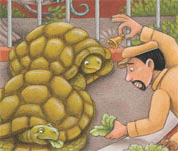
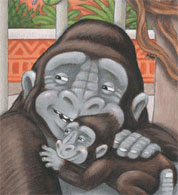
I adored the illustrations from the start. I had envisioned bright, bold illustrations for this book, and Ben Hodson couldn't have done a more amazing job. I was particularly amazed with the animal facial expressions--he captured the essence of the story flawlessly and added such clever twists to the text!
What do you love about writing? What is it about children's books you love?
I love writing because I loved reading. As a child, I read everything I could get my hands on--I'd even sneak hardware catalogs out of the Sunday paper and read them under my covers at night with a flashlight when I couldn't find anything else--it's true! Personally, I love to write because it's a creative release for my soul. I love writing children's books because they allow children to imagine themselves somewhere else, with character like themselves or completely different than themselves. Children's books are magical--writing them allows me to remember what it's like to be a kid, to imagine without boundaries.
What authors and/or books have influenced you the most?
When I was a kid myself, I couldn't get enough of Dr. Seuss. I must have read One Fish Two Fish Red Fish Blue Fish  about a million times. In elementary school, I loved the Serendipity books, and those little Beatrix Potter books. As I got older, I became entranced with Island of the Blue Dolphins
about a million times. In elementary school, I loved the Serendipity books, and those little Beatrix Potter books. As I got older, I became entranced with Island of the Blue Dolphins , by Scott O'Dell, A Wrinkle in Time
, by Scott O'Dell, A Wrinkle in Time by Madeleine L'Engle, and Little Women
by Madeleine L'Engle, and Little Women , by Louisa May Alcott. And Judy Blume books! Oh, I devoured them every chance I got--brilliant! All decidedly different, these books had one thing in common--they reached me somehow, on some level, enough that they somehow became a part of me.
, by Louisa May Alcott. And Judy Blume books! Oh, I devoured them every chance I got--brilliant! All decidedly different, these books had one thing in common--they reached me somehow, on some level, enough that they somehow became a part of me.
When you're not writing, what can we find you doing?
Besides writing, I'm the mom to two lovely kids, ages seven and four. I'm also back in school, working toward my Master's Degree in Education. In my spare time, you'll often find me with my camera, taking lots and lots of pictures, or in my kitchen--this writer LOVES to cook!
What can we expect to see from you next?
Ooh, lots of things are in the works. I just had three books released from Capstone Press (African Animals: Giraffes ; African Animals: Lions
; African Animals: Lions  ; African Animals: Zebras
; African Animals: Zebras ), which were a lot of fun to write. I'm currently submitting a picture book about a mischievous elf in a library and switching genres a bit to work on a novel-in-verse for middle-grade readers. I'm also working on some greeting cards for the adult market--the life of a writer is never dull!
), which were a lot of fun to write. I'm currently submitting a picture book about a mischievous elf in a library and switching genres a bit to work on a novel-in-verse for middle-grade readers. I'm also working on some greeting cards for the adult market--the life of a writer is never dull!
Thanks for hosting me. It's been wonderful "chatting" with you.
No, thank YOU Catherine, and best wishes!
Today we honour the Indigenous peoples of this land, the oldest continuing cultures in human history.
We reflect on their past mistreatment.
We reflect in particular on the mistreatment of those who were stolen generations - this blemished chapter in our nation's history.
The time has now come for the nation to turn a new page in Australia's history by righting the wrongs of the past and so moving forward with confidence to the future.
We apologise for the laws and policies of successive Parliaments and governments that have inflicted profound grief, suffering and loss on these our fellow Australians.
We apologise especially for the removal of Aboriginal and Torres Strait Islander children from their families, their communities and their country.
For the pain, suffering and hurt of these stolen generations, their descendants and for their families left behind, we say sorry.
To the mothers and the fathers, the brothers and the sisters, for the breaking up of families and communities, we say sorry.
And for the indignity and degradation thus inflicted on a proud people and a proud culture, we say sorry.
(the rest is here)
 There is a multitude of unique stories about how people became involved in the children’s book industry; some knew they wanted to write or illustrate books from the time they were young, others studied the industry and their art form for years, and still others taught themselves and worked hard to break in to the industry.
There is a multitude of unique stories about how people became involved in the children’s book industry; some knew they wanted to write or illustrate books from the time they were young, others studied the industry and their art form for years, and still others taught themselves and worked hard to break in to the industry.
On this edition of Just One More Book!, Mark speaks with illustrator Ben Hodson about his versatile illustration style, the role of illustrations in social justice and how hard he worked to establish himself as a children’s book illustrator.
Books mentioned:
Tags:
Ben Hodson,
childrens books,
How The Moon Regained Her Shape,
In Arctic WatersBen Hodson,
childrens books,
How The Moon Regained Her Shape,
In Arctic Waters



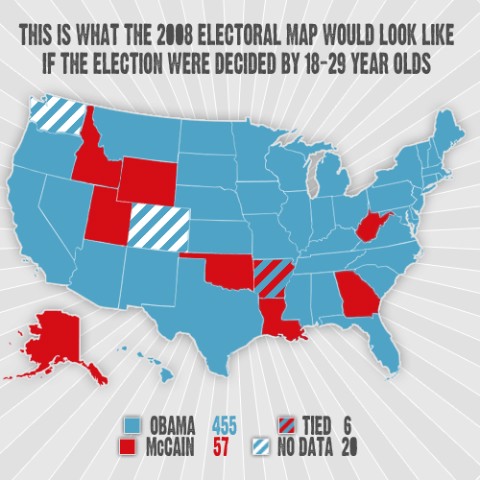





 There is a multitude of unique stories about how people became involved in the children’s book industry; some knew they wanted to write or illustrate books from the time they were young, others studied the industry and their art form for years, and still others taught themselves and worked hard to break in to the industry.
There is a multitude of unique stories about how people became involved in the children’s book industry; some knew they wanted to write or illustrate books from the time they were young, others studied the industry and their art form for years, and still others taught themselves and worked hard to break in to the industry.
Wow, and here was I thinking Sparks couldn't sink any lower.
I mean really, an interview with Miley Cyrus?
Go, Lili, go! Excellent ranting about a subject that needs a lot of ranting.
Also, further to the Telegraph article's claim that'Women are predominant, in terms of numbers and power, in most of the major publishing houses' - well, numbers is indubitable, but power? Millions of women editors, a good number of women publishers, but just how many publishing houses in Australia and around the world have women CEOs or managing directors?
So.... not only does Nicholas Sparks write things that make me want to flee bookstores and movie theaters - usually two of my favorite kinds of places - but he's a pompous jackass to boot. Also kinda dumb. AWESOME.
Fab post, though.
beautifully said!
Go Lili! I'm with you, girl! Let's rant together in April!
Congrats on your commendation in the Barbara Jefferis Award for Pink. Not having read any of the other titles, I shouldn't really say this, but Pink should have won!
I was going to say this on your post about the commendation, but the comments kind of degenerated, so I left them to their ranting. i prefer your ranting so much more.
Its a good thing we have Barbara Jefferis and her generous husband. perhaps Sparks could read some of the shortlist and highly commended titles :)
Great ranting, Lili.
That Nicholas guy seems a right arrogant prick. Who knew?